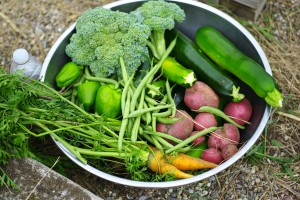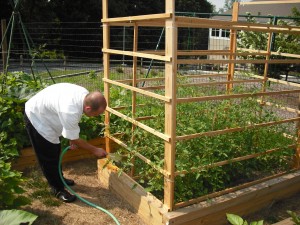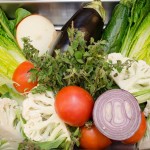 From veggies to Spring gardens to whole-grains, March is about living healthy. You already know eating plenty of vegetables is key. But, did you know fruits and vegetables immediately begin losing valuable nutrients, like vitamin C, from the moment they are picked?
From veggies to Spring gardens to whole-grains, March is about living healthy. You already know eating plenty of vegetables is key. But, did you know fruits and vegetables immediately begin losing valuable nutrients, like vitamin C, from the moment they are picked?
 By the time vegetables travel from the vine to your plate, they could have significantly fewer nutrients. Unless you live in a year-round warm climate with access to fresh local produce you may be missing out. Frozen fruits and vegetables could be the solution. Contrary to popular belief, they're very nutritious. The use of flash-freezing shortly after harvest helps retain nutrients, making frozen produce a good alternative to fresh.
Not all frozen produce is created equal. Some varieties add sodium or fat in the form of seasonings and sauces. To lower sodium and/or fat, read labels and select plain versions, then add your own flavorings!
Here are some other advantages to frozen produce:
By the time vegetables travel from the vine to your plate, they could have significantly fewer nutrients. Unless you live in a year-round warm climate with access to fresh local produce you may be missing out. Frozen fruits and vegetables could be the solution. Contrary to popular belief, they're very nutritious. The use of flash-freezing shortly after harvest helps retain nutrients, making frozen produce a good alternative to fresh.
Not all frozen produce is created equal. Some varieties add sodium or fat in the form of seasonings and sauces. To lower sodium and/or fat, read labels and select plain versions, then add your own flavorings!
Here are some other advantages to frozen produce:
- Cost - Frozen produce is often cheaper than fresh, especially during winter months. A good rule of thumb is to purchase out-of-season produce in frozen form (blueberries in winter) and continue to buy fresh, in-season produce (butternut squash in winter).
- Shelf Life - Frozen produce lasts longer than fresh, which means less waste. Plus, the extended shelf life makes it easier to keep produce on hand.
- Availability - Produce you normally wouldn't buy fresh (not local/in-season, cost prohibitive), may be found in the freezer aisle. Foods like asparagus or berries are readily available in frozen form and cost a lot less







